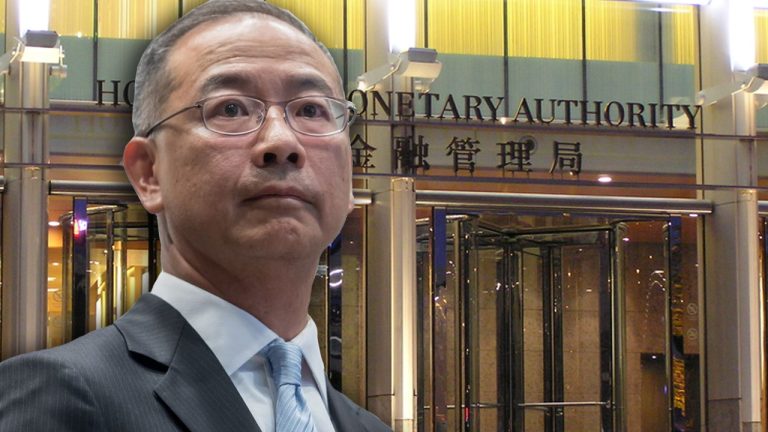 The Hong Kong Monetary Authority (HKMA) has moved into Phase 2 of its e-HKD pilot program, expanding its exploration into tokenized deposits and e-HKD. With 11 groups of firms selected, the initiative delves into practical applications such as offline payments and asset settlement. The creation of an industry forum aims to solve potential challenges while […]
The Hong Kong Monetary Authority (HKMA) has moved into Phase 2 of its e-HKD pilot program, expanding its exploration into tokenized deposits and e-HKD. With 11 groups of firms selected, the initiative delves into practical applications such as offline payments and asset settlement. The creation of an industry forum aims to solve potential challenges while […]
The two central banks are aiming to align their financial service sectors and said both share “many complementary strengths.”
Hong Kong and the United Arab Emirates' (UAE) central banks are looking to collaborate on cryptocurrency regulations and financial technology development.
On May 30, the Hong Kong Monetary Authority (HKMA) said it met with its counterparts at the Central Bank of the United Arab Emirates (CBUAE) with the two agreeing to “strengthen cooperation” on “virtual asset regulations and developments.”
The two central banks also pledged to facilitate discussions on “joint fintech development initiatives and knowledge-sharing efforts” with each region’s respective innovation hubs.
Financial infrastructure and financial market connectivity between the two jurisdictions were also noted as key points discussed.
CBUAE governor H.E. Khaled Mohamed Balama said he anticipates the relationship with the HKMA will be ongoing and long-term.

HKMA chief executive Eddie Yue said the relationship will benefit both jurisdictions economically as they share “many complementary strengths and mutual interests.”
Following the meeting, the two central banks held a seminar for senior executives from banks in Hong Kong and the UAE.
It covered various topics, including how cross-border trade settlement can be improved and exploring how UAE corporations can leverage Hong Kong’s financial infrastructure platforms in order to gain access to Asian and mainland markets.

The collaboration comes as Hong Kong’s Securities and Futures Commission (SFC) is allowing virtual asset service providers (VASPs) to cater to retail investors in Hong Kong starting June 1.
Meanwhile, on May 30 Hong Kong’s treasury chief Christopher Hui told the AFP that the city has allowed retail investors to trade crypto under its new regulatory regime because “virtual assets are going to stay.”
Hui claimed the benefits of utilizing cryptocurrencies outweighed the risks.
Related: Hong Kong to open crypto exchange access for retail users, but there’s a catch
"Despite the potential risks involved, (virtual assets) also carries with it fundamental value," he said, noting the importance of regulation:
"So for these positive elements to be harnessed, these activities have to be allowed in a regulated way."
Several cryptocurrency exchanges have filed applications to have dedicated Hong Kong crypto trading services since the SFC announced the application process, including CoinEx, Huobi and OKX.
Magazine: FTX 2.0 coming up, Multichain FUD and Worldcoin raises $115M: Hodler’s Digest, May 21-27
 Following the Bank of England explaining that it would be meddling in U.K. bond markets and the Bank of Japan defending the yen in the foreign exchange market last week, the Hong Kong Monetary Authority (HKMA) revealed it intervened in forex markets on Wednesday. Hong Kong’s central bank detailed that it interfered in forex markets […]
Following the Bank of England explaining that it would be meddling in U.K. bond markets and the Bank of Japan defending the yen in the foreign exchange market last week, the Hong Kong Monetary Authority (HKMA) revealed it intervened in forex markets on Wednesday. Hong Kong’s central bank detailed that it interfered in forex markets […]
Phillip Lowe believes that there are risks in dealing with cryptocurrency that can be mitigated by strong regulations, but the tech should be made by private companies.
Australian central bank Governor Phillip Lowe said that a private solution “is going to be better” for cryptocurrency as long as risks are mitigated through regulation.
Lowe commented at a recent G20 finance meeting in Indonesia. Reuters reported on July 17 that officials from other countries discussed the impact of stablecoins and decentralized finance (DeFi) on global financial systems.
Recent risks associated with stablecoins can largely be chalked up to depegging events. In May, the Terra USD stablecoin UST, which has since changed to Terra Classic USD (USTC), lost its peg and drove down the value of the entire Terra Classic ecosystem. It caused a multi-billion dollar cascade effect leading to Tether (USDT) and the DEI stablecoin briefly depegging.
Lowe suggested that strong regulations or even state backing could help mitigate the risks to the public.
"If these tokens are going to be used widely by the community, they are going to need to be backed by the state or regulated just as we regulate bank deposits."
While the regulations would come from the government side, Lowe noted that the technology would be best if it were developed by the private sector. In his view, private companies are “better than the central bank at innovating” the best features for cryptocurrency.
He added, “there are also likely to be very significant costs for the central bank setting up a digital token system."
The National Association of Federally-Insured Credit Unions shared Lowe’s skepticism about implementing a digital token at central banks due to high costs in a letter to the U.S. Commerce Department, according to Cointelegraph on July 8.
However, his view on the costs of digital token systems at central banks is not echoed by the countries currently developing or experimenting with central bank digital currencies (CBDC), such as China, the European Union, and the Bahamas.
In the same G20 meeting, Hong Kong Monetary Authority CEO Eddie Yue backed Lowe’s opinion that stablecoins should be scrutinized more closely. He said that reliable stablecoins would, in turn, reduce risks in DeFi, where stablecoins act as the main transactional currency.
Related: Aussie FPA supports 'crypto rule book' and regulation of exchanges
Referring to DeFi and stablecoins, Yue said, “the technology and the business innovation behind these developments are likely to be important for our future financial system.”